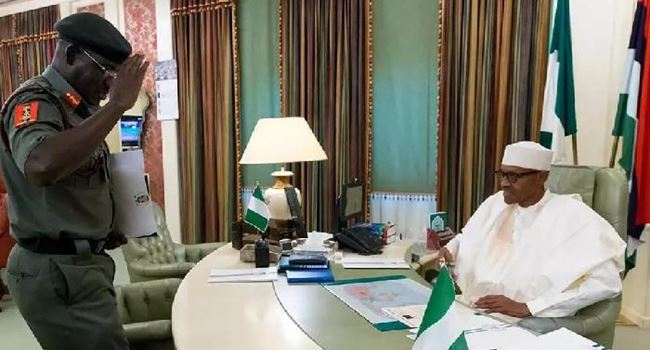News
Henceforth, Military uniforms, others will be made in Nigeria –Buhari

In an effort to revive the country’s Cotton, Textiles and Garment (CTG) sector, President Buhammadu Buhari has ordered that the military uniform among other clothing for government workers should hence be made in the country.
The Central Bank of Nigeria (CBN) Governor Godwin Emefiele at a meeting with Service chiefs and heads of paramilitary agencies on Thursday revealed the order.
The meeting was to discuss the enforcement of the Executive Order 003 signed by President Muhammadu Buhari, mandating all Ministries, Departments and Agencies (MDAs) to source their textile needs locally.
Emefiele while speaking, told the security chiefs that the apex bank enjoys the President’s support in its efforts to revive the Cotton, Textiles and Garment (CTG) sector.
He explained that: “We have the mandate of Mr. President to ensure that all uniformed services and theatre wears in hospitals and medical facilities be sourced locally from the Nigerian CTG sector.”
To ensure the enforcement of the Presidential Order, he said: “The Bureau of Public Procurement (BPP) has been notified to enforce compliance among MDAs.
“Our model in achieving this presidential directive is to facilitate long term contracts (five years or more) with our textile and garment factories to produce uniforms for our armed forces and uniform services using local fabrics and textile materials.
“We are not naive of the fact that the nature of your jobs will warrant special quality and security around the production of your wares. My team will work with your nominees toward ensuring requisite quality and security associated with your uniforms. Your nominees will also join our team to inspect the various textiles and garment factories to ensure their readiness to be engaged on long term contracts to forestall breaches.
“The CBN will work out payment terms that fit budget releases for uniforms for various organisations.”
Emefiele also noted that the priority placed on the CTG sector was hinged on the belief that “It has the capacity to transform Nigeria’s rural economy and revive the textile and garment industries by creating over two million jobs, improve internal revenue across three tiers of government, and reduce $4 billion import bill incurred annually on textile and apparel.
“The CTG sector has the potential to safeguard and earn foreign exchange and ultimately accelerate industrial development by making Nigeria a global player in the textile and apparel sectors.
“We analysed the huge potentials that exist in the sector, identified the challenges militating against the sector’s contribution to Nigeria’s growth and development and presented quick wins for reviving the sector. Crucial to this resolve is the call for patriotism and the need to support local manufacturers of textile through patronage by MDAs as entrenched in Executive Order 003.”
He affirmed that the President has directed full compliance with the Order to address the pressure on our foreign reserves through demands for forex for the importation of textile and clothing materials.
Emefiele said: “Based on the CBN’s interactions with stakeholders, it was revealed that MDAs have not made any significant order for uniforms or clothing materials from Nigerian textile manufacturers and garment companies.”
He said the governments’ efforts at resuscitating the textile industry would not be actualised if they are not supported through local patronage among other incentives.
With regards to the primary source of CTG cotton, Emefiele said the CBN has “put in place necessary mechanisms to ensure use of high yielding varieties that will produce top quality fabrics and those that can compete in the international market.
“We have also observed that our textile factories are carrying huge quantities of unsold stock while our garment factories are idle due to lack of local patronage. We are optimistic that with your support, this trend can be reversed.”
Join the conversation
Support Ripples Nigeria, hold up solutions journalism
Balanced, fearless journalism driven by data comes at huge financial costs.
As a media platform, we hold leadership accountable and will not trade the right to press freedom and free speech for a piece of cake.
If you like what we do, and are ready to uphold solutions journalism, kindly donate to the Ripples Nigeria cause.
Your support would help to ensure that citizens and institutions continue to have free access to credible and reliable information for societal development.






















